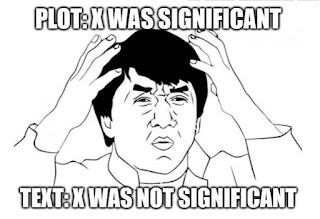Conquering PTSD ("Presentation" Traumatic Stress Disorder)
I used to get quite nervous whenever I had to deliver a presentation to a room of people. I could feel butterflies in my stomach from the moment I got up to speak until the moment I finished my presentation. However, I think for this task (public speaking) in particular, having to do it over and over and especially seeing other scientists I admire give talks has really been the crucial factor in helping me control what I'll playfully refer to as PTSD ("presentation" traumatic stress disorder) in this blog!
For Journal Club specifically, I was able to prepare my slides and get great feedback from a BE Comm Lab fellow the day before I had to present. I got really useful advice that helped me to tighten up my slides (I had way too many), improve figure titles, condense slides for impact, and clarify explanations that needed to be delivered more effectively. Thinking back to all the presentations I have had to give for classes pre- and post-MIT, I truly think that each presentation has enabled me to incrementally conquer PTSD and feel more and more confident about public speaking. Attending a bunch of thesis defenses and seminars over the summer and formulating my own opinions about the effectiveness each speaker had during their presentation also made me realize how crucial and ubiquitous scientific communication is as a skill.
Contrary to what many may think, most of science is really just mastering the art of communicating effectively. Writing grant requests, preparing research proposals, writing protocols, maintaining lab notebooks, giving presentations/lab meetings/journal clubs/poster talks/seminar talks/lectures, learning the language of the technical literature in one's field, writing textbook chapters and collaborating or spearheading authorship of papers/patents are in my view the highlights of a scientific career - and this all relies on effective communication. Putting this in perspective and realizing that being able to do what you love (science) for the rest of your career unambiguously requires these skills became for me the best cure for PTSD.
For Journal Club specifically, I was able to prepare my slides and get great feedback from a BE Comm Lab fellow the day before I had to present. I got really useful advice that helped me to tighten up my slides (I had way too many), improve figure titles, condense slides for impact, and clarify explanations that needed to be delivered more effectively. Thinking back to all the presentations I have had to give for classes pre- and post-MIT, I truly think that each presentation has enabled me to incrementally conquer PTSD and feel more and more confident about public speaking. Attending a bunch of thesis defenses and seminars over the summer and formulating my own opinions about the effectiveness each speaker had during their presentation also made me realize how crucial and ubiquitous scientific communication is as a skill.
Contrary to what many may think, most of science is really just mastering the art of communicating effectively. Writing grant requests, preparing research proposals, writing protocols, maintaining lab notebooks, giving presentations/lab meetings/journal clubs/poster talks/seminar talks/lectures, learning the language of the technical literature in one's field, writing textbook chapters and collaborating or spearheading authorship of papers/patents are in my view the highlights of a scientific career - and this all relies on effective communication. Putting this in perspective and realizing that being able to do what you love (science) for the rest of your career unambiguously requires these skills became for me the best cure for PTSD.

Comments
Post a Comment